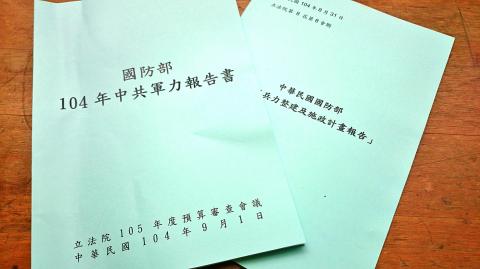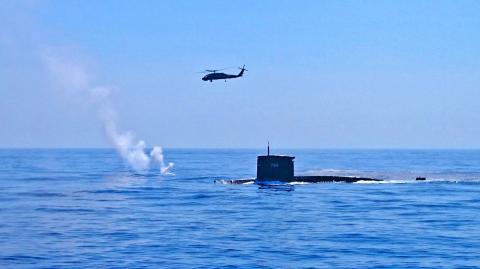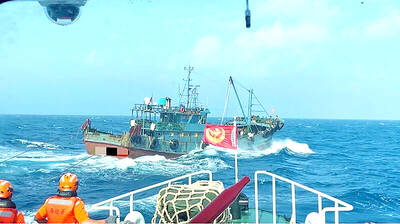China continues to target Taiwan for attack and invasion in the event of conflict, and Beijing is likely to declare a South China Sea air defense identification zone (ADIZ) in the near future to bolster its claim on the islets and reefs in the region, the Ministry of National Defense (MND) said.
According to MND reports released yesterday, Beijing convened high-level meetings to re-evaluate its cross-strait policies following last year’s Sunflower movement and related protests by Taiwanese against the government’s move to force a cross-strait service trade agreement with China through the legislature.
The report said China is concerned about the outcome of Taiwan’s presidential and legislative elections in January next year, and its People’s Liberation Army (PLA) has therefore conducted a series of military drills in recent months simulating an invasion of Taiwan, known as “Operation Decapitation,” in which airborne paratroopers and special forces practiced descending on the Presidential Office Building in Taipei City in a rapid assault.

Photo: Lo Tian-pin, Taipei Times
Outlining China’s plans for attack against Taiwan, the report said Beijing would first use a combination of military threats and actions to intimidate Taiwanese, then blockade major ports of the nation’s frontier islands, such as Kinmen, Matsu and other outlying maritime territories.
After that, PLA missiles and other firepower would be deployed to attack Taiwan’s major military and political headquarters, along with telecommunications infrastructure, which would be followed by mounting airborne and amphibious landings for an invasion.
The report said the possible scenarios for a Beijing attack could arise from situations such as Taiwan’s declaration of independence or heading unequivocally toward independence, acquisition of nuclear weapons, internal political turmoil, delaying of dialogue on cross-strait negotiations toward unification, foreign forces interfering in Taiwan’s internal affairs, or deployment of foreign troops in the country.

Photo: Lo Tian-pin, Taipei Times
The ministry said Taiwan’s armed forces are capable of defending the nation, and would undertake drills to simulate a defense of the Presidential Office Building and the greater Taipei area, in what is dubbed “Counter-Operation Decapitation,” during the yearly Han Kuang military exercises, which are scheduled to take place next week.
In the past few days, marine amphibious units together with other special forces troops have been seen conducting drills along coastal regions and shores of the Tamsui River (淡水河) in northern Taiwan, while the military police brigade tasked with maintaining the security of the Presidential Office Building have also been training to defend against a potential attack.
The report concluded that China’s island-building spree in the South China Sea has completely changed the strategic structure in the region, adding that China has stepped up militarization and to claim sovereignty while exploring deposits of oil, hydrocarbons and other natural resources.
China has begun reclamation work on seven reefs and is undertaking construction of a seaport, airport runways and other infrastructure facilities, the report said.
Additional reporting by CNA

The Republic of China (ROC) is celebrating its 114th Double Ten National Day today, featuring military parades and a variety of performances and speeches in front of the Presidential Office in Taipei. The Taiwan Taiko Association opened the celebrations with a 100-drummer performance, including young percussionists. As per tradition, an air force Mirage 2000 fighter jet flew over the Presidential Office as a part of the performance. The Honor Guards of the ROC and its marching band also heralded in a military parade. Students from Taichung's Shin Min High School then followed with a colorful performance using floral imagery to represent Taiwan's alternate name

COGNITIVE WARFARE: Chinese fishing boats transmitting fake identification signals are meant to test Taiwan’s responses to different kinds of perceived incursions, a report said Chinese vessels are transmitting fake signals in Taiwan’s waters as a form of cognitive warfare, testing Taipei’s responses to various types of incursions, a report by the Institute for the Study of War said on Friday. Several Chinese fishing vessels transmitted fake automatic identification system (AIS) signals in Taiwan’s waters last month, with one mimicking a Russian warship and another impersonating a Chinese law enforcement vessel, the report said. Citing data from Starboard Maritime Intelligence, the report said that throughout August and last month, the Chinese fishing boat Minshiyu 06718 (閩獅漁06718) sailed through the Taiwan Strait while intermittently transmitting its own AIS

CHINESE INFILTRATION: Medical logistics is a lifeline during wartime and the reported CCP links of a major logistics company present a national security threat, an expert said The government would bolster its security check system to prevent China from infiltrating the nation’s medical cold chain, a national security official said yesterday. The official, who wished to stay anonymous, made the remarks after the Chinese-language magazine Mirror Media (鏡周刊) reported that Pharma Logistics (嘉里醫藥物流) is in charge of the medical logistics of about half of the nation’s major hospitals, including National Taiwan University Hospital and Taipei Veterans General Hospital. The company’s parent, Kerry TJ Logistics Co (嘉里大榮物流), is associated with the National Committee of the Chinese People’s Political Consultative Conference (CPPCC) and the Chinese People’s Liberation Army (PLA), the

COVETED PRIZE: The US president would be a peace prize laureate should he persuade Xi Jinping to abandon military aggression against Taiwan, William Lai said US President Donald Trump should get the Nobel Peace Prize should he be able to convince Chinese President Xi Jinping (習近平) to abandon the use of force against Taiwan, President William Lai (賴清德) told a conservative US radio show and podcast in an interview. The US is Taiwan’s most important international backer, despite the absence of formal ties, but since Trump took office earlier this year he has not announced any new arms sales to the nation. Trump could meet Xi at the APEC summit in South Korea on Oct. 31 and Nov. 1. Lai, speaking on The Clay Travis and Buck Sexton